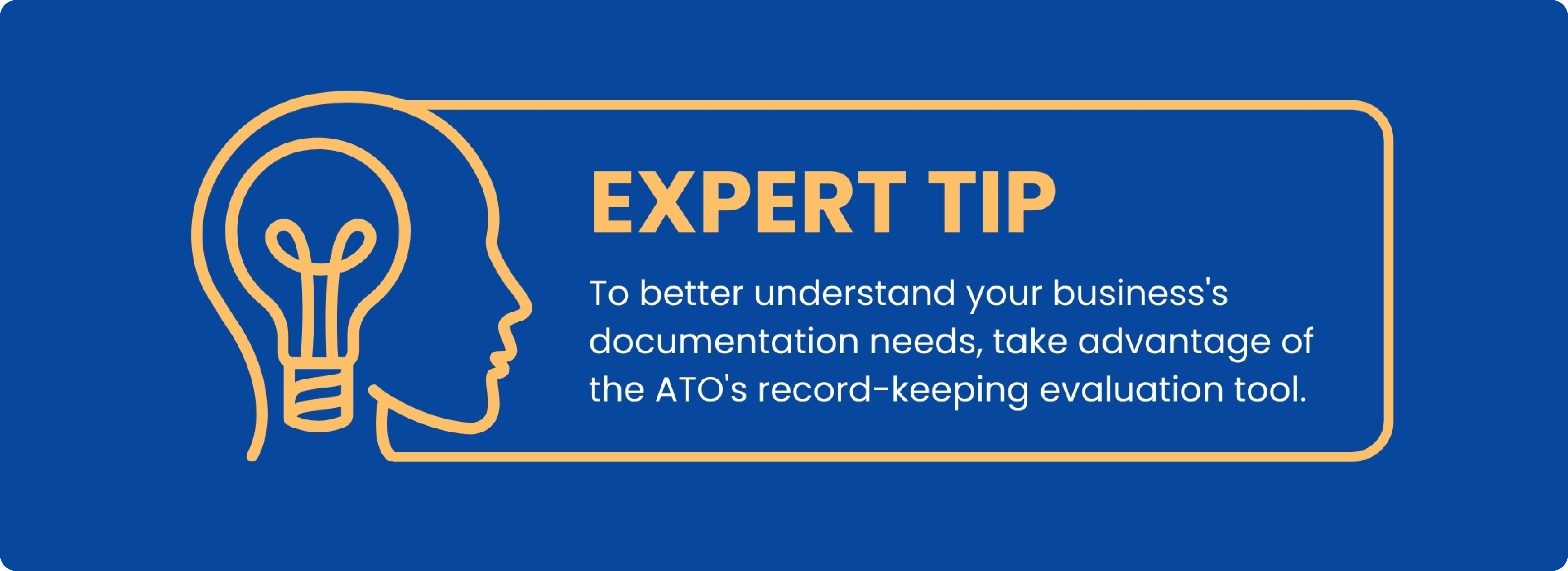

Many small businesses are uncertain about how long they should retain their financial records, often overwhelmed by the volume of paperwork or the disorganization of digital documents.
Understanding how long you should keep business records will help you avoid these problems, turning a potential headache into a streamlined process that supports your business's growth and compliance. With the right approach, you can ensure that your record-keeping practices are about staying out of trouble with tax authorities and empowering your business decisions.
This blog is written to clarify the critical aspects of financial record-keeping in Australia. It offers straightforward advice on the necessary records to maintain, the tools to help streamline this process and the advisable length of time for their retention. So, read on for insights that will simplify your approach to record management.
Record keeping refers to logging, storing, and disposing of crucial financial information for a business.
The Australian Taxation Office (ATO) recommends keeping records digitally or manually.
Essential records for small businesses include detailed invoices, bank statements, and more.
Good record-keeping is crucial for making informed decisions, staying compliant, and efficiently managing finances.
Record keeping refers to the process of logging, storing, and disposing of crucial financial information for a business. To properly document most expenses, it's essential to obtain a receipt or a comparable document from the vendor. An adequate record should comprehensively include the following:
The Australian Taxation Office (ATO) recommends the following ways to keep your records organised and up to standards:
To run your small business smoothly and stay compliant, here are the key records you need to keep:

You might’ve thought you only need to keep your business or tax documents for five years, but in Australia, the actual requirements can vary based on several factors.
While the general rule is indeed to maintain these records for five years from the date you lodge your tax return, there are specific circumstances where it's necessary to keep them for more than 5 years.
This extended period is remarkably advisable to cover various contingencies and ensure full compliance with all regulatory requirements. The period for keeping records in the following situations is:
In specific situations, businesses need to keep records for more than the standard five-year retention period. These include:

Information is a primary organisational asset that is needed now and into the future. It serves as the foundation upon which businesses build their strategies, make informed decisions, and navigate the complexities of the modern market. Here's how good record-keeping plays a pivotal role in leveraging this asset for sustained growth and resilience:
The push from the ATO for businesses to move towards digital record-keeping marks a significant shift in how companies manage their finances. In this digital era, the transition to online systems is not just recommended but becoming essential for growth.
As your business expands, the simplicity of digital record-keeping becomes clear, especially when old ways just don't cut it anymore. This is when it's key to start using up-to-date accounting software and online storage options.
Tools like Quickbooks and Xero are leading the way in this digital change, providing strong options for businesses looking for better efficiency and safety in managing their records.
These platforms are easy to use, making it simple for anyone to switch to digital, even without a lot of bookkeeping experience. They help you easily turn all your financial documents into digital files, making them easy to access for reports. Going digital, whether on your own or with an expert's help, makes keeping records easier and safer.
We understand that keeping your financial records organized and up-to-date is crucial for the health and growth of your business. However, we also know it's not always as simple to get on top of your records and bookkeeping as we made it sound in this post.
The reality is that managing your records can sometimes feel overwhelming, especially when you're trying to juggle it with all the other responsibilities of running a business. That's where CleanSlate comes into the picture.
Outsourcing your bookkeeping taks to us means you can shift your focus back to what you care about—growing your business. Instead of getting bogged down with data entry and trying to make sense of your financials, let us take care of it for you. We are also available to help you find the best system and solution that works for you, ensuring your business survives and thrives.Contact us today for personalised assistance and to learn more about how we can help.
Table of contents
Join fellow entrepreneurs to receive regular expert advice
Get regular updates and educational resources designed by CleanSlate to help you make the right business decisions. No spam. Unsubscribe at any time.

Subscribe
Free business guides
Easy to read e-books, guides, and checklists to help you run your business smoothly.
Try our easy-to-use calculators to get a snapshot of where your business stands financially.
Our accounting experts are available to provide you with the guidance and support you need. We offer a wide range of services, including bookkeeping, business advice and tax planning.


Need expert advice for your financial goals? Schedule a meeting with our professional today.
For urgent matters that can’t wait, please call us right away.
If you have any questions or concerns, please leave a message.